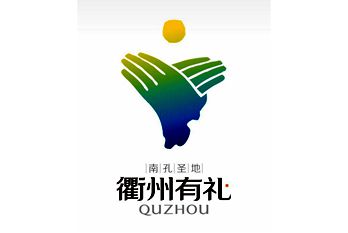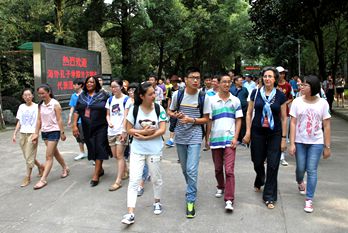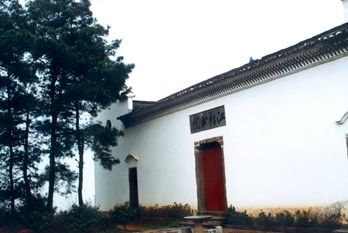A novel luminary of martial arts stories

Covers for the various English editions of the four books of Jin Yong's Legends of the Condor Heroes. [Photo provided to China Daily]
Celebrations are commemorating the 100th birth anniversary of well-known wuxia author Jin Yong, Zhang Kun reports in Shanghai.
This year marks the centennial of the birth of Jin Yong, one of the most popular authors in China, who raised wuxia, a martial arts fiction genre, to such an artistic level that readers and academics launched a petition in the 2010s for him to become a Nobel Prize candidate.
Sometimes referred to as the "Chinese J.R.R. Tolkien", Jin Yong is the pen name of Louis Cha Leung-yung (1924-2018), PhD. His acclaim hails from 15 wuxia novels and short stories he wrote from 1955 to 1972 that have sold millions of copies worldwide.
"Whichever corner of the world you are in, you will find Jin Yong's books as long as there are Chinese people around," says Zhang Donghe, head of the publicity department of Jiaxing city, Zhejiang province.
At the public forum commemorating his centennial birthday that took place in Jiaxing on March 11, scholars and readers recalled signing, or declining to sign, the petition asking the Swedish Academy to consider Jin Yong for the Nobel Prize in literature.
Chen Mo, a researcher of Jin Yong's novels, says he declined to sign it, because it's unfair to view the Nobel Prize as the ultimate recognition of a writer's achievements, and Jin Yong has made such a great impact that his name would remain indelible in China's literary history for centuries to come.
Jin Yong was born in 1924 to an esteemed family in Haining, a county-level city under the administration of Jiaxing. The Cha family produced many scholars, high-ranking officials and talented creatives across centuries. Jin Yong spent his childhood and teenage years in Haining, Jiaxing, Quzhou and other parts of Zhejiang before moving to Hong Kong, where he spent most of his life and built his career as a journalist, novelist, publisher and political commentator.
Starting in March, colorful events in Zhejiang and Hong Kong are celebrating the life of this great author.
The most comprehensive exhibition featuring Jin Yong's archival materials opened on March 10 at the Kangqiao 1924 Chinese Silk Cultural and Creative Park of Haining, showcasing more than 800 precious items. They include his manuscripts, calligraphy, editions of his books, old newspapers in which his novels were serialized and digital exhibits. Among the most valuable items are the serialized manuscripts of The Smiling, Proud Wanderer, and the manuscripts of Demi-Gods and Semi-Devils, provided by the Hong Kong Ta Kung Pao Media Group and Ming Pao Group.
His former residence in Haining was reconstructed in 1998 to replicate his home according to the memories of the author and his family. The house officially opened to the public on March 12, when an exhibition was launched featuring his life story, including his six visits to Haining after moving to Hong Kong, when he made donations and supported local cultural, educational and economic development.
His memories of his home province, especially its landscapes and culture, remained close to his heart throughout his life, which is widely reflected in his creation of his martial arts universe, known in Chinese as jianghu, which literally means "rivers and lakes".
"Jin Yong is a great author from Haining, and we are grateful that in his novels he has brought a whole universe of martial arts back to his hometown," Chen Wei, Party secretary of Jiaxing, said at the forum for the centennial commemoration on March 11.
Jin Yong's first novel, The Book and the Sword, was based on a Haining folk tale in which Emperor Qianlong of the Qing Dynasty (1644-1911) was actually of the Han rather than the Manchurian ethnic group as the result of a baby swap. The novel, like his other books, contains vivid descriptions of local landmarks, delicacies and social customs.
A new edition of The Book and the Sword was recently released in Haining, along with an illustrated map, featuring all the important locations in the city and nearby regions of Zhejiang that are mentioned in Jin Yong's novels.
Folk opera productions adapted from his books, including shadow-puppet shows, are performed. Documentaries about his life story, including his visits and contributions to his hometown, have been released.
Haining's government constructed the traditional garden house Jin Yong Shuyuan in Yanguan town in 2008 with Jin Yong's personal support. It serves as a center for the exhibition and research of his literary and academic achievements.
On March 11, a 3D-animated video featuring the imagery of Jin Yong's novels was projected on Jiaxing's ancient city wall that was rebuilt in 1908. Jin Yong's novels served as the theme of the evening marketplace near the wall in March. The streets were decorated with red lanterns, and musicians played live music from TV series, adapted from his novels. Actors dressed as characters in his books were walking around, buying snacks and souvenirs.
Wuxia tales were found in Chinese literature as long ago as the second and third centuries BC. Jin Yong was fascinated with these tales of adventure from an early age.
The chivalrous and rebellious heroes depicted in traditional Chinese wuxia stories seemed to have left their mark on his mindset during his youth. Jin Yong was expelled from school twice. The first time was from senior middle school because he wrote a satirical essay about the director of discipline. The second time was from a central university in Chongqing where he studied, because he was disrespectful to the headmaster.
In 1947, he became a journalist for Ta Kung Pao in Shanghai. The second year, the newspaper sent him to work in Hong Kong. Later, he was transferred to New Evening Post as deputy editor and began to write his first martial arts novel. The Book and the Sword was serialized in 1955.
In 1959, he co-founded the newspaper, Ming Pao. He served as its editor-in-chief for years, while also writing serialized novels.
In 1972, he concluded the final chapter of the Deer and the Cauldron and announced it would be his last martial arts novel. From then on, he remained focused on journalism and went on to write thousands of editorials for Ming Pao and Ta Kung Pao.
Later, he was involved in the drafting of the Hong Kong Basic Law in preparation for the 1997 handover of Hong Kong to the Chinese mainland.
He went on to edit his martial arts novels after retirement in the 1990s and played an active part in promoting cultural communication between the Chinese mainland and Hong Kong. Jin Yong died in Hong Kong in 2018 at the age of 94.
Jin Yong's novels were translated into other Asian languages when they were serialized in from the 1950s through the '70s, but the European-language editions didn't come out until the late 1990s and early 2000s.
In 2012, Anna Holmwood, a translator from Britain, and literary agent Peter Buckman initiated a new project for the translation of Jin Yong's most popular novels, the Condor Heroes Trilogy — Legends of the Condor Heroes, The Return of the Condor Heroes and The Heaven Sword and Dragon Saber.
The English edition of Legends of the Condor Heroes was published in 2021, and the first volume of The Return of the Condor Heroes came out last October. These books have sold more than 100,000 print and audio copies, and received more than 10,000 readers' ratings on Amazon and similar websites.
The publisher Maclehose Press launched a new edition of Legends of the Condor Heroes this month with a new cover design for the centennial.
Gigi Chang Ching, co-translator of the books, spoke about receiving letters from readers, at Jin Yong's memorial forum at the Haining campus of Zhejiang University on March 12. They told her in these letters that overseas Chinese teenagers were eagerly anticipating the new volumes and talking about the stories with their parents.
Overseas Chinese students began adopting Jin Yong's novels into computer games as early as 1995, and 42 online games have been created since, in addition to other martial arts themed games that hail to the "core spirit of his creations", says Hu Zhipeng, senior vice-president of NetEase Group.
All of Jin Yong's novels have been adapted for film and TV — some multiple times. Producer and director Zhang Jizhong dedicated 18 years of his career to making eight TV series based on his books. In 1999, he persuaded Jin Yong that he would shoot his stories in the style of literary classics and was granted the copyright for just 1 yuan ($0.14).
"We searched all over China for the striking natural landscapes to portray his creation of a fantasy world for grownups," Zhang Jizhong says.
New TV series based on Jin Yong novels are still being made, although Zhang Jizhong says he won't make another himself.
Now, there are so many forms of entertainment, and short videos have changed people's viewing habits.
"I'm sure Jin Yong's stories will find new ways to reach the hearts of one generation after another," he says.

 City brand logo - fist-and-palm salute
City brand logo - fist-and-palm salute Confucianism on campus
Confucianism on campus The culture of the academy
The culture of the academy